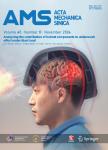残余应力对脉搏波速度与动脉血压之间关系的影响
The effect of residual stresses on the relation between pulse wave velocity and blood pressure in arteries作者机构:School of Mechanics and Aerospace EngineeringSouthwest Jiaotong UniversityChengdu 610031China Applied Mechanics and Structure Safety Key Laboratory of Sichuan ProvinceSouthwest Jiaotong UniversityChengdu 610031China Key Laboratoryof Applied MechanicsDeparment of Engineering MechanicsTsinghua University Bejing 00084China Laboratory of Flexible Electronics TechnologyTsinghua UniversityBejing 100084China
出 版 物:《Acta Mechanica Sinica》 (力学学报(英文版))
年 卷 期:2023年第39卷第9期
页 面:141-148页
核心收录:
学科分类:08[工学] 080502[工学-材料学] 0805[工学-材料科学与工程(可授工学、理学学位)]
基 金:supported by the National Natural Science Foundation of China(Grant Nos.U20A6001 11972207 11921002)
主 题:脉搏波速度 人体血压 残余应力 二次函数 血压波动 动脉血压 血压监测 材料参数
摘 要:通过脉搏波速度实时监测人体血压波动是目前先进的无创连续血压监测技术.以前研究中脉搏波速度和血压间的理论关系没有考虑到残余应力的影响,这会使结果不准确,特别是没有考虑动脉轴向的残余应力.本文为脉搏波速度-血压关系建立了一个新的分析模型,它考虑了残余应力以及动脉的几何和材料参数对波速的影响.此外,在人体血压范围内将含有残余应力的脉搏波速度-血压关系被证明可以简化为二次函数,并详细讨论了残余应力、动脉的几何和材料参数对函数影响.



